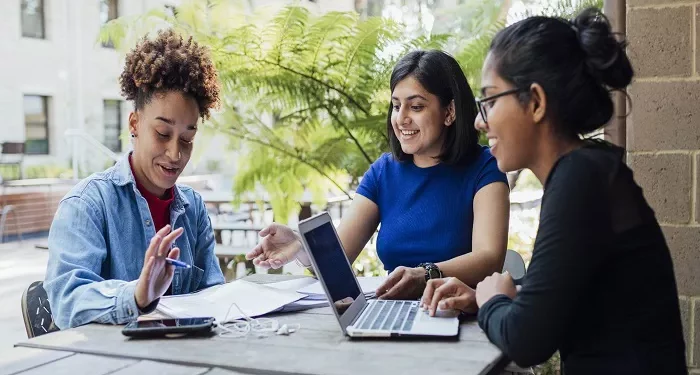For Indian students looking to pursue higher education in Australia, the process can seem daunting but with proper planning and understanding, it can be a smooth and rewarding experience. Here is a detailed guide on how to make the transition from India to Australia for study.
Research and Choose the Right Course and Institution
Identify Your Interests and Goals: Start by considering your academic interests, career aspirations, and personal preferences. What field of study do you want to pursue? What are your long-term career goals? Answering these questions will help you narrow down your choices and find a course and institution that aligns with your needs.
- Consider Future Prospects: Think about the job market and demand for your chosen field in both India and Australia. Research the career opportunities and potential earnings after graduation.
- Personal Preferences: Consider factors such as location, campus environment, size of the institution, and extracurricular activities. Do you prefer a big city or a smaller town? Are you looking for a campus with a vibrant social life or a more focused academic environment?
Research Australian Universities and Courses: Once you have a clear idea of your interests and goals, start researching Australian universities and courses. Look for institutions that are well-known for your chosen field of study and have a good reputation for academic excellence.
- Rankings and Reviews: Check university rankings and read reviews from current and past students. This can give you an idea of the quality of education, facilities, and student life at different institutions.
- Course Offerings: Look at the course curriculum, teaching methods, and assessment criteria. Make sure the course meets your academic needs and interests.
- Scholarships and Financial Aid: Look for scholarships and financial aid opportunities offered by universities and external organizations. This can help reduce the cost of your studies.
Consult Education Consultants: If you are unsure about which course or institution to choose, consider consulting an education consultant. These professionals can provide personalized advice based on your academic background, interests, and goals.
- Credible Consultants: Look for consultants who are registered with the relevant authorities and have a good track record of helping students. Ask for references and read reviews before choosing a consultant.
- Free vs. Paid Services: Some consultants offer free services while others charge a fee. Consider your budget and the services offered before making a decision.
Meet the Admission Requirements
Academic Requirements: Most Australian universities require Indian students to have completed 12 years of schooling or an equivalent qualification. You will also need to meet the specific academic requirements for your chosen course, which may include a certain percentage of marks in your final exams.
- Standardized Tests: Some courses may require you to take standardized tests such as the SAT, ACT, or GMAT. Check the admission requirements of your chosen course and prepare accordingly.
- English Language Proficiency: Since English is the language of instruction in Australian universities, you will need to demonstrate proficiency in English. This is usually done by taking an English language test such as IELTS, TOEFL, or PTE.
- Minimum Scores: Check the minimum English language test scores required by your chosen institution. Aim for scores that are above the minimum requirements to increase your chances of admission.
Documentation Requirements: In addition to academic qualifications and English language test scores, you will need to submit several documents as part of your application. These may include your transcripts, certificates, passport, and a statement of purpose.
- Transcripts and Certificates: Make sure to obtain official transcripts and certificates from your school or college. These should be in English or accompanied by a certified translation.
- Passport: Make sure your passport is valid for at least six months beyond your intended stay in Australia.
- Statement of Purpose: Write a clear and concise statement of purpose that explains your reasons for choosing the course and institution, your academic and career goals, and your personal qualities and experiences.
Application Deadlines: Make sure to check the application deadlines for your chosen course and institution. Applications for Australian universities usually open several months in advance, so it’s important to start the application process early to avoid missing the deadline.
- Early Applications: Some universities offer early admission or scholarships for students who apply early. Consider applying as soon as possible to increase your chances of admission and financial aid.
- Late Applications: In some cases, universities may accept late applications, but this is usually subject to availability and may involve additional fees. Avoid applying late if possible.
Apply for a Student Visa
Understand the Visa Requirements: Before applying for a student visa, make sure you understand the requirements and procedures. You will need to provide evidence of your acceptance into an Australian institution, financial capacity to support your studies and living expenses, and English language proficiency.
- Genuine Temporary Entrant (GTE) Requirement: As part of the visa application process, you will need to demonstrate that you are a genuine temporary entrant and have a legitimate reason for studying in Australia. This may involve providing a statement explaining your intentions and plans after graduation.
- Health and Character Requirements: You will also need to meet certain health and character requirements. This may include undergoing a medical examination and providing police clearance certificates.
Gather the Required Documents: To apply for a student visa, you will need to gather several documents, including your passport, acceptance letter from an Australian institution, financial statements, and English language test scores.
- Financial Statements: You will need to provide evidence of your financial capacity to support your studies and living expenses in Australia. This may include bank statements, scholarship letters, or sponsorship letters.
- Insurance: You will also need to purchase Overseas Student Health Cover (OSHC), which is mandatory for all international students in Australia.
Apply for the Visa: Once you have gathered all the required documents, you can apply for a student visa online through the Department of Home Affairs website. Make sure to fill out the application form carefully and provide all the required information.
- Application Fees: There is a fee for applying for a student visa. Make sure to check the current fee and pay it online as part of the application process.
- Processing Time: The processing time for student visas can vary depending on several factors, including the volume of applications and the complexity of your case. Make sure to apply well in advance of your intended start date to allow enough time for processing.
Prepare for Your Arrival in Australia
Book Your Flights: Once you have received your student visa, you can book your flights to Australia. Look for flights that are convenient and affordable, and make sure to book well in advance to get the best deals.
- Direct vs. Connecting Flights: Consider whether you want to take a direct flight or a connecting flight. Direct flights are usually more convenient but may be more expensive. Connecting flights can be cheaper but may involve longer travel times and layovers.
- Travel Insurance: Consider purchasing travel insurance to cover any unexpected events or emergencies during your journey.
Find Accommodation: Before you arrive in Australia, you will need to find accommodation. There are several options available, including on-campus accommodation, homestays, and private rentals.
- On-Campus Accommodation: Many universities offer on-campus accommodation for international students. This can be convenient and provide a supportive community environment. However, it may be more expensive than other options.
- Homestays: Homestays can be a great way to experience Australian culture and improve your English language skills. You will live with an Australian family and have access to meals and support.
- Private Rentals: Renting a private room or apartment can be more independent but may require more effort to find and manage. Make sure to research the area and landlord carefully before signing a lease.
Pack Your Bags: Make sure to pack all the necessary items for your studies and stay in Australia. This may include clothing, books, electronics, and personal items.
- Seasonal Clothing: Check the weather in Australia and pack appropriate clothing for the season. Australia has a diverse climate, so make sure to bring layers and weather-resistant clothing.
- Study Materials: Bring all the necessary books, notebooks, and stationery for your studies. You may also want to bring a laptop or tablet for note-taking and research.
- Personal Items: Don’t forget to pack personal items such as toiletries, medications, and a first aid kit.
Settle in and Start Your Studies
Attend Orientation: Most universities in Australia offer orientation programs for international students. These programs are designed to help you settle in and get familiar with the campus, facilities, and services.
- Campus Tours: Take part in campus tours to get to know the layout and locations of important buildings such as the library, classrooms, and student services.
- Academic Advising: Meet with academic advisors to discuss your course schedule, requirements, and options. They can also provide advice on study skills and resources.
Register for Courses: After attending orientation, you will need to register for your courses. Make sure to follow the registration instructions provided by your institution and choose courses that meet your academic requirements and interests.
- Course Selection: Consider your long-term career goals and choose courses that will help you develop the skills and knowledge you need. You may also want to consult with your academic advisor or professors for advice.
- Timetable: Once you have registered for your courses, you will receive a timetable. Make sure to check the schedule and plan your study and social activities accordingly.
Make Friends and Get Involved: Studying in a foreign country can be lonely at times, so it’s important to make friends and get involved in campus life. Join clubs, attend social events, and participate in extracurricular activities to meet new people and have fun.
- Student Clubs: There are many student clubs and organizations on campus that cater to different interests and hobbies. Join a club that interests you and make new friends.
- Volunteer Opportunities: Look for volunteer opportunities on campus or in the community. This can be a great way to give back, gain experience, and meet new people.
- Social Events: Attend social events such as parties, concerts, and sports games. This is a great way to relax and have fun after a busy week of studies.
Conclusion
Making the journey from India to Australia for studies requires careful planning and preparation. By following these steps and taking advantage of the resources available, you can have a successful and rewarding experience studying in Australia. Good luck!
Related Topics:



















